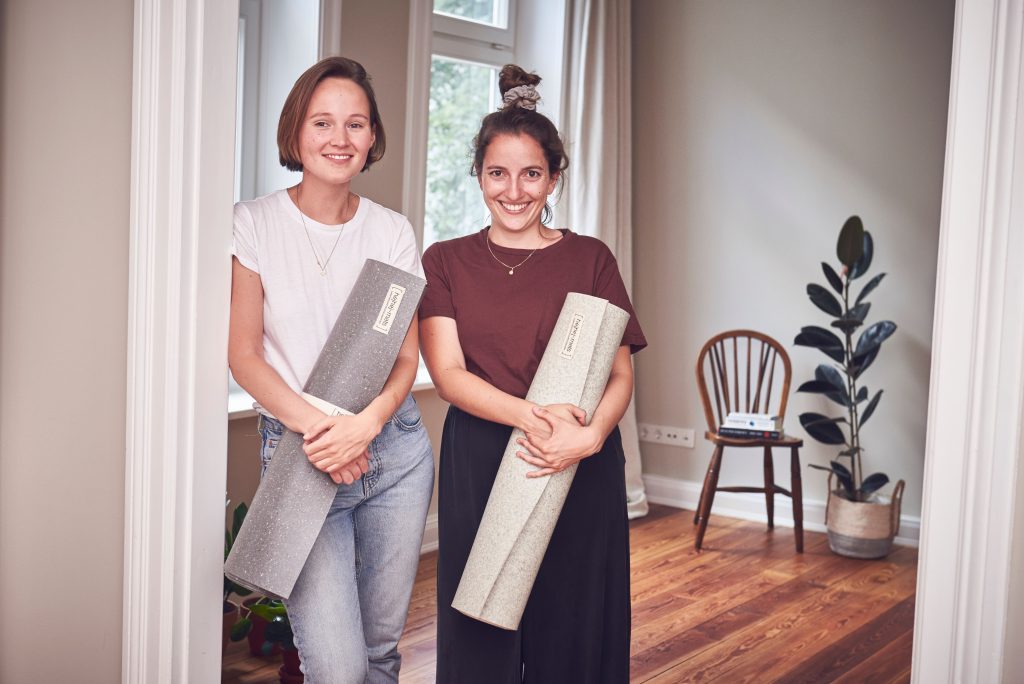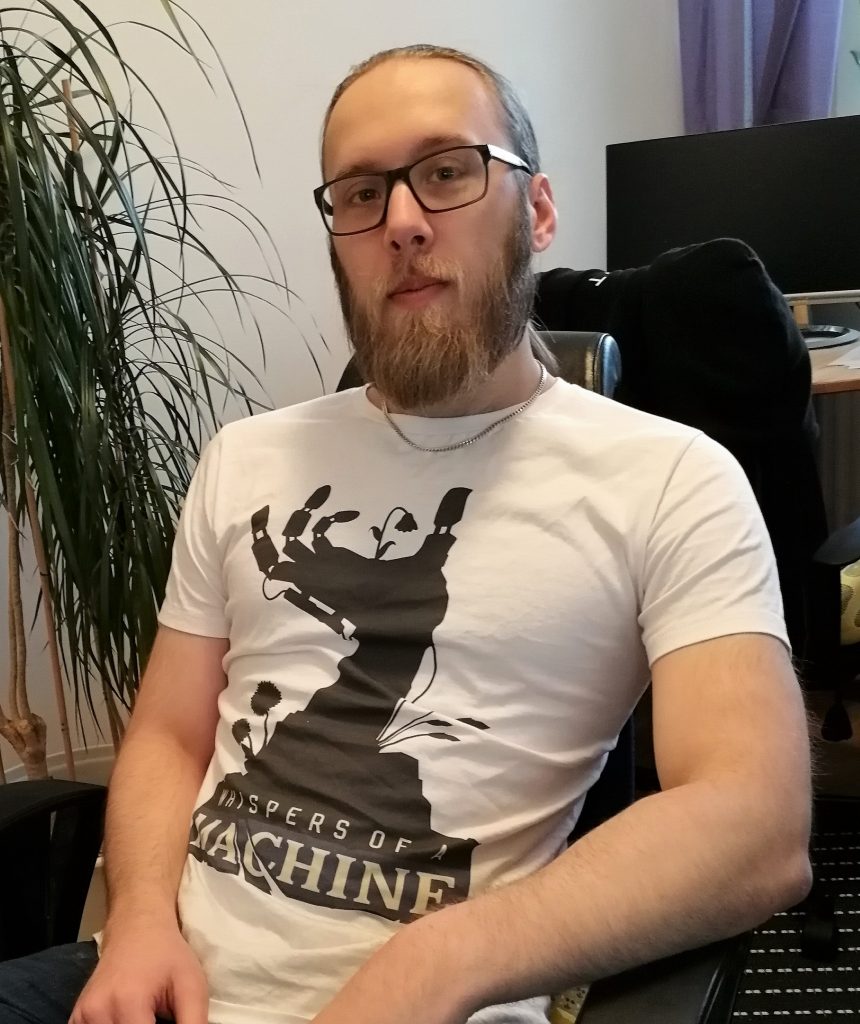
What kind of business do you run? When did you start it and where is it based?
I am an actor and voice actor and have been working mainly from the studio for the last few years. I do a lot of different things, like image films for industrial clients, advertising, but also a lot of audio books and computer games. That means I do everything from battle roars in Assassin’s Creed to sleep stories in Calm. I started doing this during my studies. Today I live and work in Berlin and sometimes in Sweden. I was just here in Östersund in front of the microphone recording for a German car brand.
Tell us a little bit about yourself and your background.
I studied theatre studies, media studies and cultural studies in Leipzig. In addition to my studies, we realised many theatre projects back then, including short films and especially radio plays. When I was studying for my master’s degree, it was still possible to try out a lot of things and take your time. There was a very good university radio station at the time, where I produced numerous radio plays with friends and also spoke radio features by colleagues from journalism. For a radio play I was able to win Sandra Hüller, who was acting in Leipzig at the time and whom I knew from the theatre in Jena, where I had previously worked as a dramaturge. After my studies I continued with a lot of independent theatre as an actor and dramaturge and, on the side, actually always as a voice over artist. So acting and the relationship to texts, coupled with talent and actually permanent work on the voice and also as a producer of my recordings paved the way into the business. In the meantime I have been working in it for almost 20 years.
What inspired you to start this business?
I think it’s mainly the desire to do something that I like very much and that I like to invest a lot of time and work in, and also to be my own boss. When you realise that you can also do it very well and earn a living doing it, it sounds like a reasonable basis for a start. With my own minimal equipment, a good microphone, a good small preamplifier and a computer, I was able to find a studio in Malta or northern Spain in a short time, where I could rent a studio at short notice and record a live session. Of course, you have to perform to the point in the recording situation. And that requires a lot of experience and skill. Both in the profession itself and in communication with the client. Listening to what exactly someone is looking for and then implementing it in such a way that you hear “Wow, that was great! I think you get close to people by giving them something very good. Yes, and I often find that very inspiring. Often not so much on a content level, it’s no secret that not every image film triggers intellectual or aesthetic feelings of happiness. But more on a relationship level with the customers, who see their product greatly enhanced by me. Or even when I get feedback on audio books or meditations that it means something to people or helps them.
What is your daily routine of running your business?
The daily routine consists mainly of recording castings, realising jobs live or independently and producing if necessary, then customer care and acquisition. If I’m booked into studios, then of course the recordings there with colleagues. And sound people are just a great bunch of people, I don’t know if it’s because of the job. But they are always cool, warm-hearted and often relaxed people who have heard a lot. I can relate well to that and enjoy the work together. It’s also a very nice thing to work together besides all the time I spend alone with my headphones on. That’s basically what I like so much about theatre projects. That you work on something for a longer period of time, go on a search together and try out a lot more and then, of course, perform in front of an audience. That is something very satisfying as an actor, to fill and experience an evening together with colleagues and an audience. Corona has really hit home and paralysed structures that had already changed before. Colleagues who had been doing theatre for a long time had to stop. I sorely miss the fact that rehearsals and plays are part of the daily routine from time to time.
How competitive is your industry?
Of course, there are a lot of voice over artists and there are always new ones coming in. You notice that sometimes over 80 people apply for a good casting. To still get such jobs is a proof of quality. But that also means that you have to be diligent and that acquisition is very important. This is just as true for established actors as it is for newcomers to the profession. Perhaps it is even more difficult to establish oneself today because of the great competition.
Which developments do you expect for the future?
Right now, the whole AI development is hovering over the business as a big threat. Nobody knows exactly where it will go and certain jobs are already being replaced by AI voices. This is a massive change not only in our field and a huge problem in the legal El Dorado. I think that we have to accept these developments to some extent. But above all, we have to concentrate on the things that we as human voice over artists can do better than AI. And before some people say, yes, then the AI must be trained accordingly – there will always be a difference between communicating with a human and with software. The moment you realise that you are only communicating with a machine that behaves like a human can be extremely irritating. We can create a consistent emotional relationship with clients and colleagues. We can adapt to studio situations and the people involved and respond intuitively to what someone or the situation needs. Based on our experience, we understand requirements that often the client cannot formulate. We are often quality controllers and can identify errors or cultural sensitivities and suggest improvements. Most importantly, we have a sense of humour and create humour. We improvise and play, we are actors who understand what we are doing, and we have all the extra sounds and non-sounds that make the thought process comprehensible and therefore unique. We are also able to implement unusual or extreme demands in a situation-appropriate way. In the same way, we are authentic and close to the action in long texts. In other words, we can leave a lasting impression and inspire through our performance, precisely because we can convey emotions in conjunction with content and expectations in a targeted manner.
How should we deal with this development?
It is now important to create legal regulations to prevent abuse. For us voice over artists, this means first of all writing general terms and conditions on our invoices. These must prohibit any use of our voice for AI models. Otherwise we run the risk of doing away with ourselves. Just as companies are not allowed to earn money with our faces without asking us, they should also not be allowed to use our voice. Even, or especially, if this is already technically possible.
What are your future plans for the company?
I would like to develop further in the direction of voice directing. And see if I can get a foot in the door in the dubbing or games business. I would also like to found a small audio book publishing company to publish productions. In other words, to make myself less dependent on orders from others. I have made many meditation and relaxation recordings and have received extremely good feedback. The things are going very well with my clients. It would be good to go my own way with it in the long term. What I’m still missing is someone who is familiar with publishing law and with the whole handling of billing systems from sales and, above all, has experience in marketing. So if anyone is interested, please say hello.
To find out more about Carsten Wilhelm, please visit his website at https://www.carstenwilhelm.com/ or contact him at [email protected]



